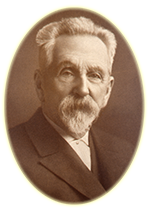
The George Brown Collection at Minpaku
An introduction to the life and work of George Brown, and his collection of ethnological artefacts.

Welcome
Since its opening in 1977, the National Museum of Ethnology
has been actively involved in ethnological research in Oceania, and has
maintained a permanent exhibition on the region. In 1985-86 the George
Brown Collection of ethnographic artefacts was purchased by our museum
from the University of Newcastle on Tyne, in England, UK. The
collection is historically and culturally significant because it was
made largely through the efforts of one collector, the Reverend Doctor
George Brown, in a sustained, decades-long effort that accompanied his
work as a pioneering Methodist missionary in the Pacific Islands. It is
also significant because it forms a material record of topics that the
collector discussed in his ethnographic and missionary writings. And of
course, it is also significant because it represents an assemblage of
cultural treasures that the peoples of many Pacific islands can turn to
for insight into the lives of their own ancestors.
Peter Matthews and Isao Hayashi
National Museum of Ethnology, Osaka, Japan.
